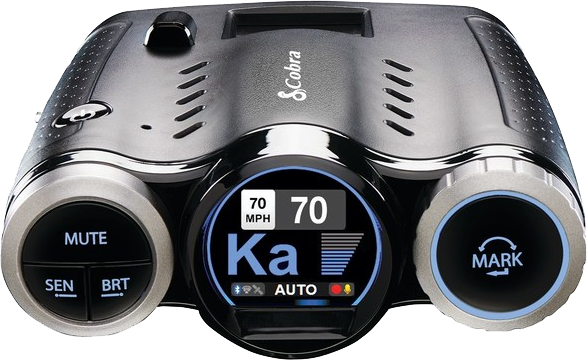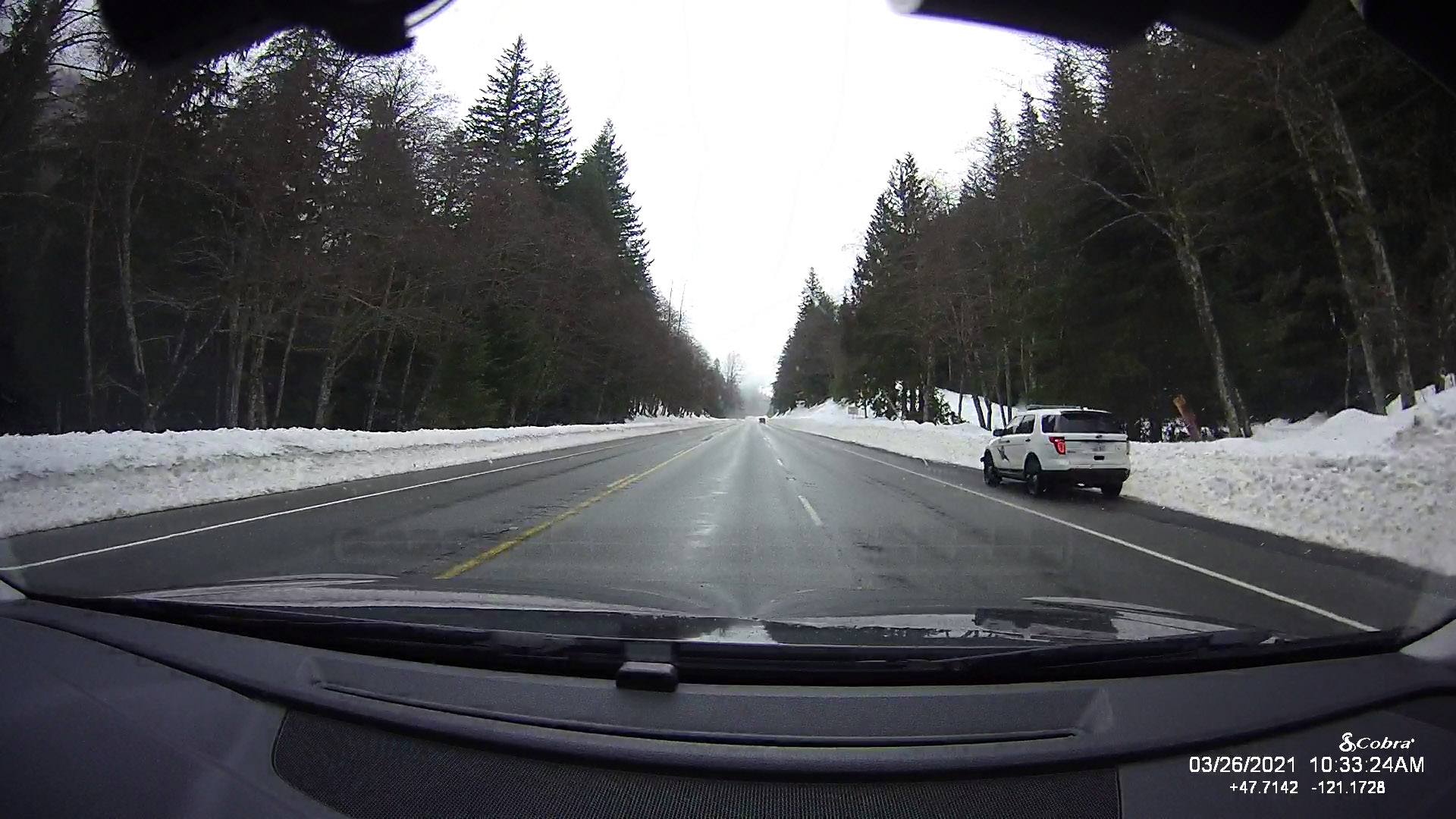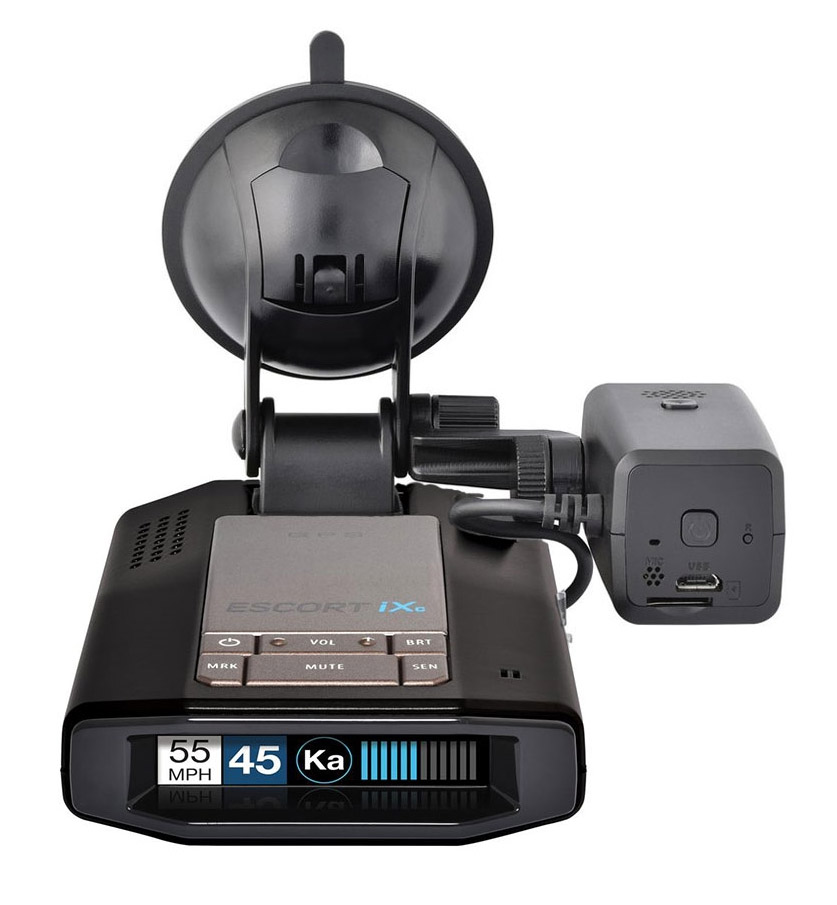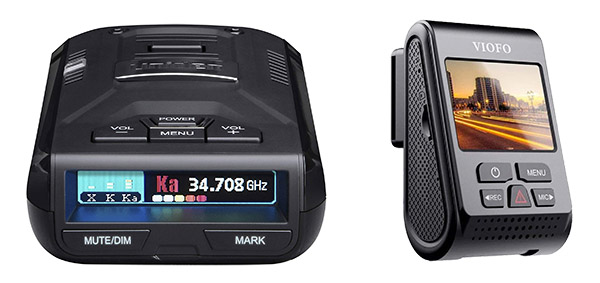The Cobra Road Scout ($449) is an integrated radar detector & dashcam combo. Beneath its funky design, you’ve got a mid-tier radar detector and a 1080p dashcam, plus GPS, Bluetooth, WiFi, and cloud connectivity. Personally I love the idea of having both a radar detector and dashcam in your vehicle and an all-in-one like this makes it easier to run and install both.
Is the Road Scout any good? There’s always going to be some compromises when going for any all-in-one unit, plus Cobra doesn’t have a great reputation as a brand, but this is one of Cobra’s “Elite Series” products. Is choosing the Road Scout better than running a standalone RD and dashcam? Are the trade-offs worth it? Let’s take a closer look.
Road Scout Overview
The main appeal of the Road Scout is that with one device, one mount, and one power cable, you’ve got both a radar detector and a dash camera in one convenient package.
It’s like adding an Escort M1 dashcam to your Escort Radar detector, except even more tightly integrated.
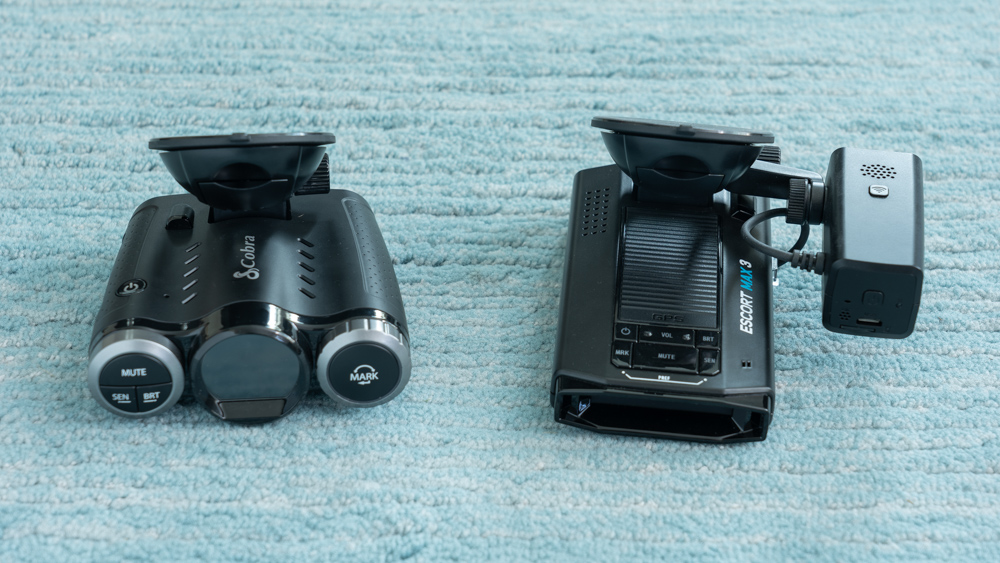
Cobra Road Scout and Escort Max 3 w/ M1 dashcam
Unfortunately though, while it does have some cool qualities, I’ve found a BUNCH of issues with the Road Scout’s performance and functionality. I think it’s a great idea, but to put it nicely, the execution leaves a lot to be desired.
Styling
In terms of design, it’s very different from most other radar detectors. It looks almost like a set of binoculars.
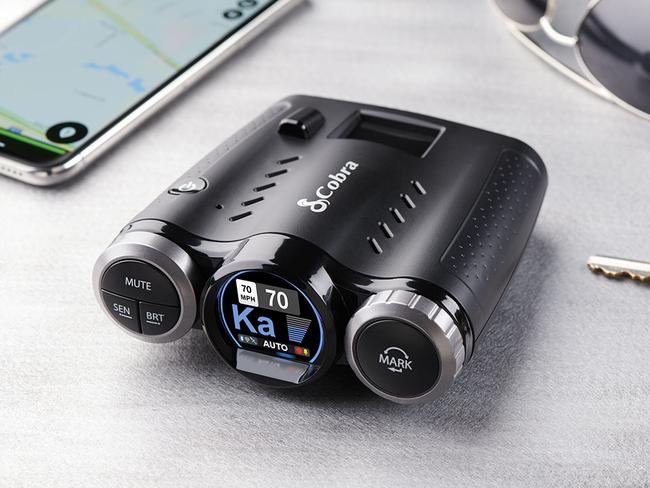
It’s a little funky and weird, but it works. I like that it’s kinda different.
Controls
Most of the buttons and controls are right on the face of the detector which I like for easy access while driving. Only the power button is on the very top.
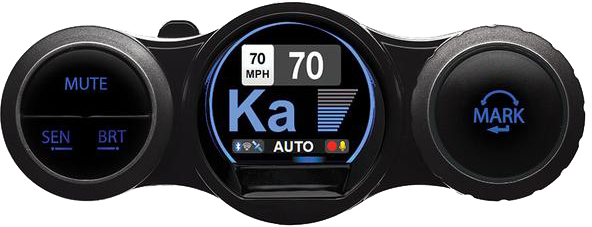
The buttons on the left let you do things like mute or lock out a radar signal, go into the detector’s menu options, adjust your detector sensitivity, or change the display brightness.
On the right you’ve got a big mark button surrounded by a rotating ring. The mark button lets you mark GPS locations where you want to be alerted or activate emergency recording on your dashcam to mark and save a specific clip.
Finally the ring around the mark button can be rotated to adjust the alert volume or to scroll through the menu options.
The display in the center visually presents all the important information like radar band and signal strength, an indicator to let you know when your dashcam is recording, your current speed, or the speed limit of the road that you’re on (when connected to the cloud). The display is mostly good, with the exception of a weird flicker when the numbers for your current speed as you speed up or slow down. The odd flicker makes the detector feel a bit cheapy.
Long Range Detection
How good is the radar detector? Well it shares the same platform as the Cobra DSP9200BT which was the first Cobra radar detector whose performance was passable. (Cobras traditionally have awful performance and thus are generally ignored by radar detector enthusiasts.)
With the Road Scout’s long range detection, you’re generally looking at a mid-tier radar detector.
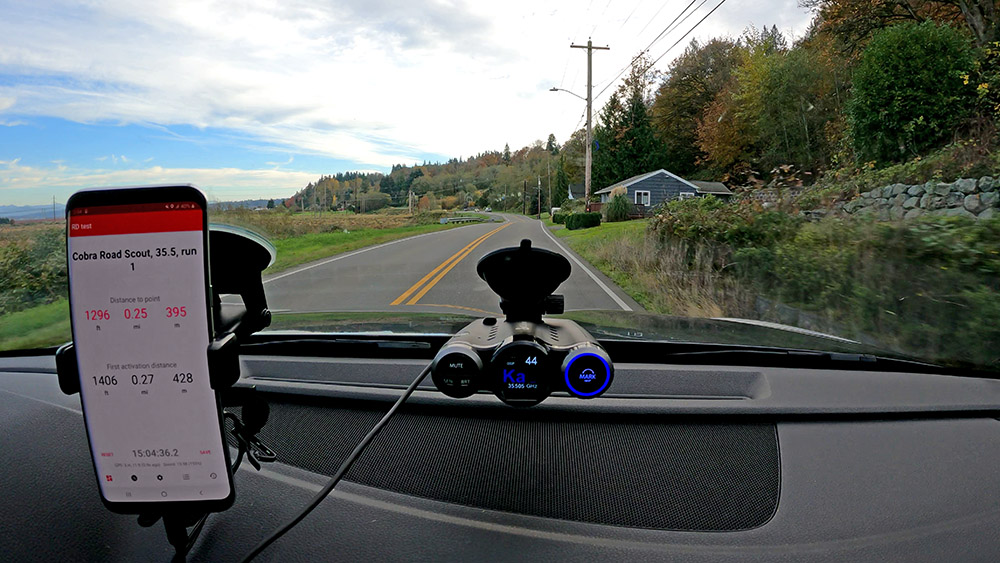
In my testing of the Road Scout against some tough competition, it came in last place on every single Ka frequency, though still enough for a save on my red barn test course. Compared to other Cobras I’ve tested in the past though, at least it could still hold its own.
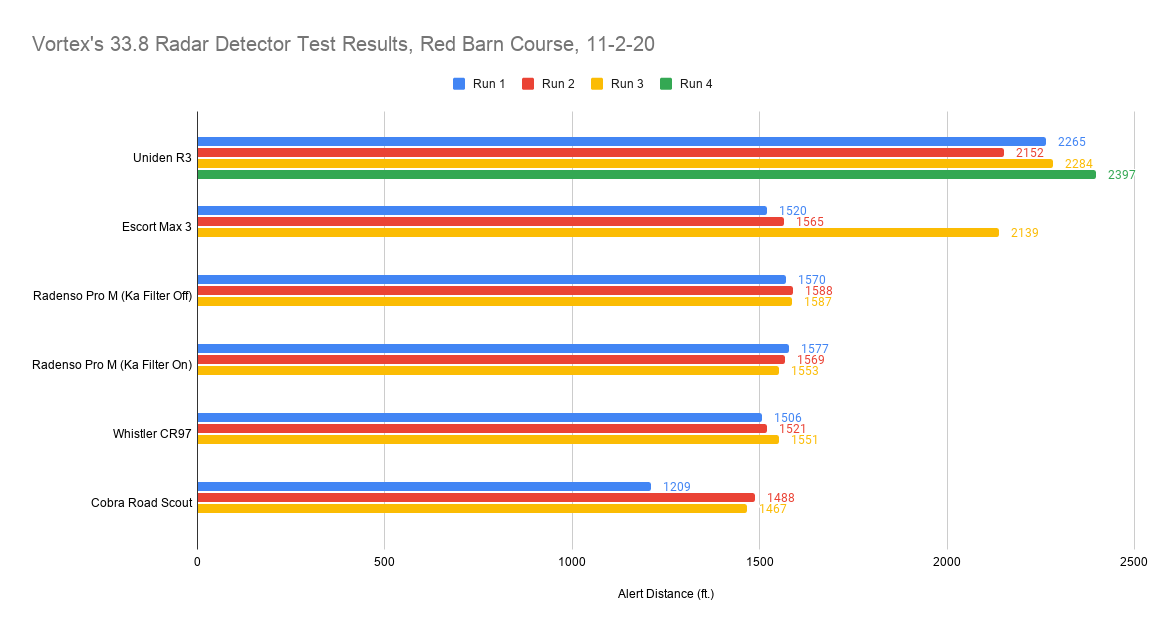
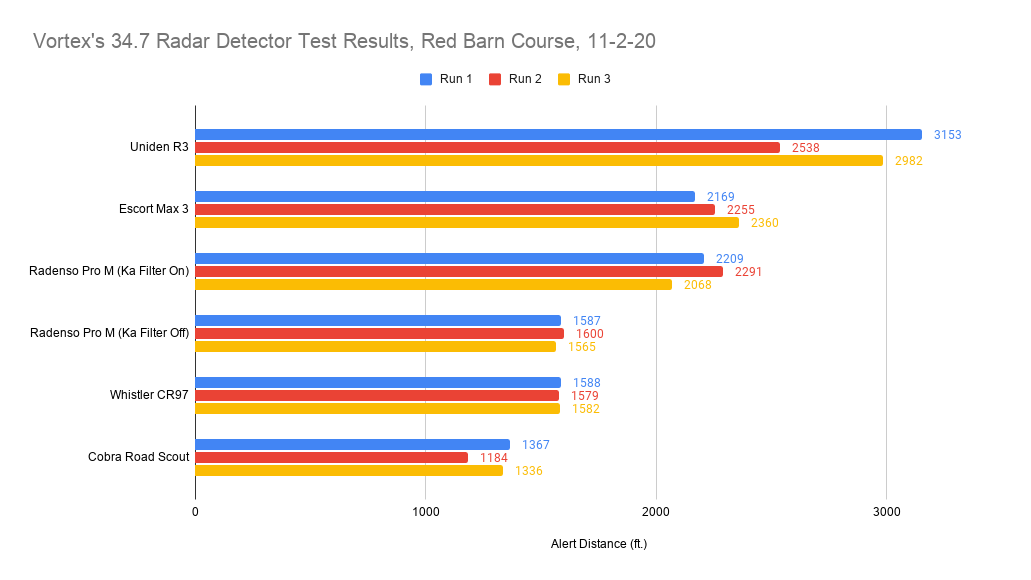
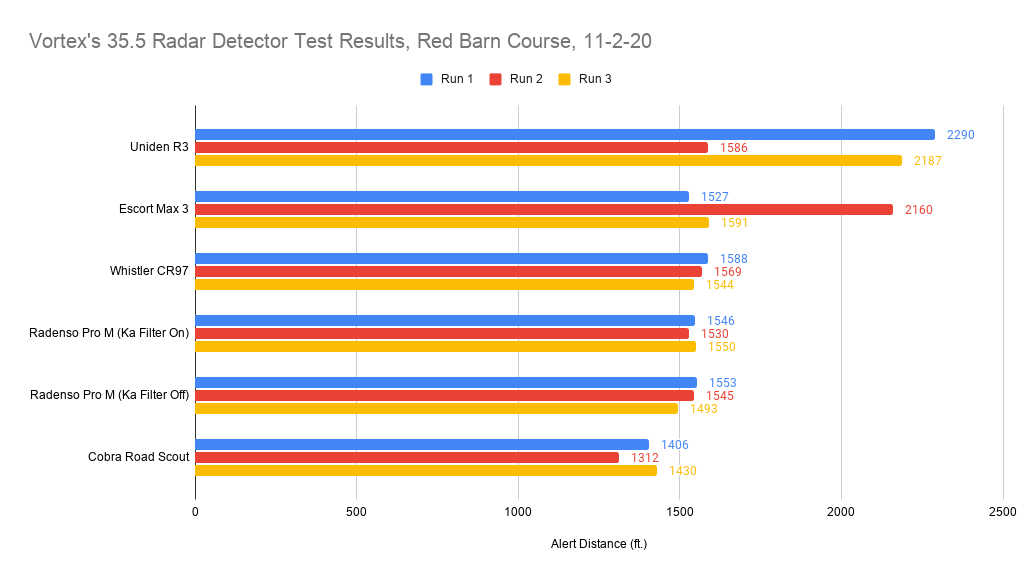
In practice, I haven’t had many impressive detections. The ones I have had, the detector typically goes off to line of sight. When I can see the police officer (even if he’s way up the road), only then does the Cobra go off.
For example, here’s the Road Scout going off to a trooper with a customer already pulled over. You’ll note that the detector only goes off once I crest the slight hill leading to the officer. So while it gave a decent amount of range, it didn’t alert until the officer was able to see me and lock in my speed with his radar gun so…
Responsiveness
If you face any instant on radar, the Road Scout is not a good choice. In fact this may be the biggest weakness with the Road Scout.
While most detectors are very quick to alert when they detect radar, alerting to Ka within a fraction of a second, the Road Scout will take several seconds to go off and begin alerting, between 2-6 seconds (!) in my testing. I suppose I could understand hyper aggressive filtering on K band where you have a lot of false alerts, but not on Ka. Those delays are unacceptable IMHO.
On K band, things can get even worse. You’ll get a similar 3-5 second delay, depending on settings. More troubling though, the detector has very poor rear sensitivity and may not alert at all when being shot from the rear, even if you’re just a few hundred feet away from the radar gun.
To give you a sense of context, here’s how the Uniden R3 fares in the same conditions:
Way better… The R3 is super responsive, alerting to shots both front and rear within just 0.2 – 0.3 sec. This is what I’d expect from a quality radar detector.
So with the limited advanced warning against constant on in tricky terrains, the unacceptably long delays in alerting to instant on, plus the possibility of not alerting at all, it makes the detector’s performance completely unusable for me. Once I had a chance to test and better understand the Road Scout, I lost confidence in the detector and wouldn’t trust it to keep me protected.
False Alert Filtering
In terms of false alert filtering, the Road Scout is pretty good, but I think that’s largely due to very heavy filtering which severely impacts performance. Additionally, I’ve run into a number of weird issues and bugs with the Road Scout that I don’t experience with better detectors.
BSM Filtering
BSM filtering in general I’d say is pretty good. It’s fairly quiet overall. Hondas and Acuras are the biggest culprits of BSM falses on K band, along with Chryslers, Buicks, and Jeeps. Those are some of your typical offenders that affect lots of detectors though.
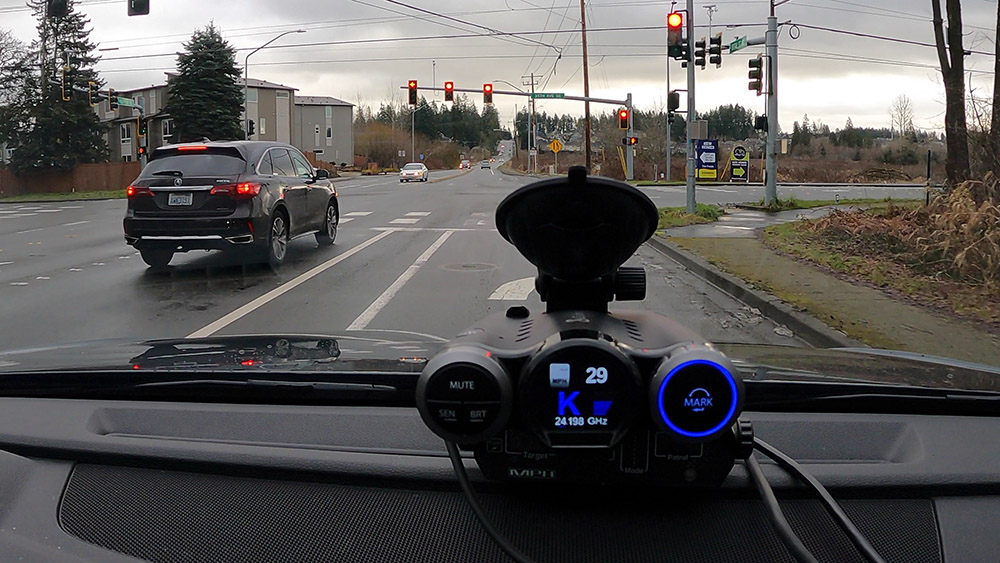
I don’t think I’ve gotten any falses from Mazda CX-5’s which is great, but oncoming Mazdas do sometimes trigger laser falses.
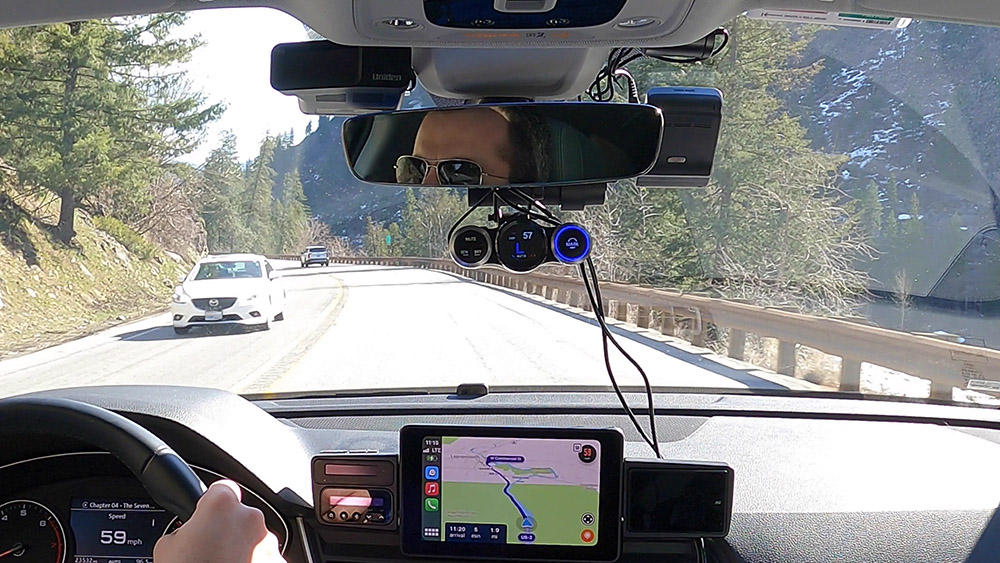
Ka Falses
On Ka band I occasionally get falses on non-police frequencies like 35.656 or 35.765, though those can be filtered out with Ka segmentation. A simplified version Ka segmentation is available (with just 7 segments total instead of the usual 10), but the frequency ranges are only +/- 100 MHz wide and so there’s a greater risk of missing out of tune guns compared to other detectors with wider segments.
- Ka Narrow 1: 33.400 – 33.700 GHz
- Ka Narrow 2: 33.700 – 33.900 GHz (33.8 guns)
- Ka Narrow 3: 33.900 – 34.600 GHz
- Ka Narrow 4: 34.600 – 34.800 GHz (34.7 guns)
- Ka Narrow 5: 34.800 – 35.400 GHz
- Ka Narrow 6: 35.400 – 35.600 GHz (35.5 guns)
- Ka Narrow 7: 35.600 – 36.000 GHz
I’ve done reactivity bench testing with both Ka Wide and segmented 2/4/6 and in both situations, just like we saw in the I/O testing videos above, the detector is as slow as molasses. I don’t see a dramatic improvement to performance with segmentation. (The tests above were with the detector segged 2/4/6 on Ka.)
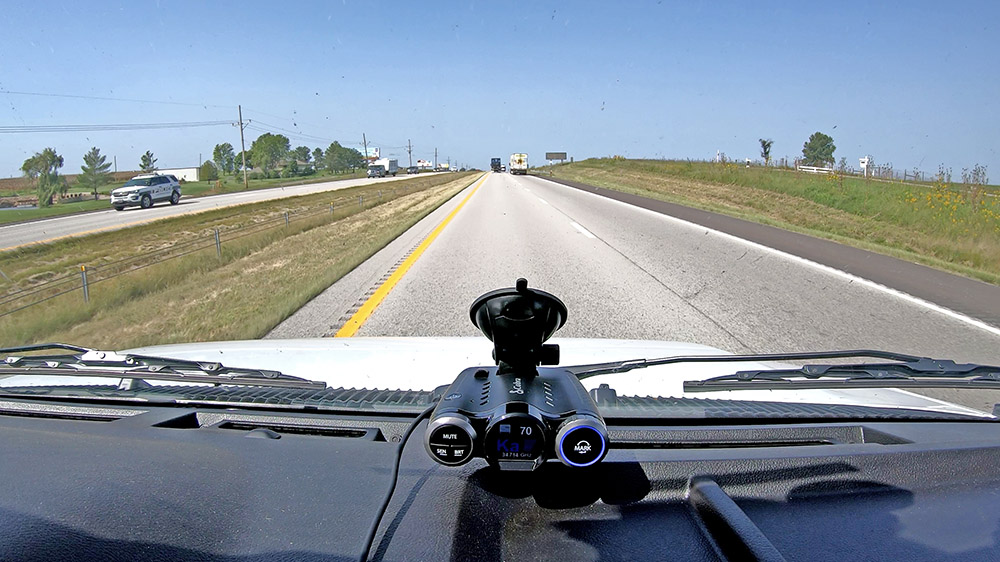
Road Scout alerting to officer shooting Ka
Manual Muting Bug
One weird issue (bug?) I’ve seen with the Road Scout on multiple occasions is that pressing the mute button may not actually mute the detector. The detector alerts, I press the mute button, it immediately quiets down and displays “Mute” on screen for a moment, but then immediately resumes alerting. The second time I press, the detector typically does mute.
I’m not a fan of my detector ignoring my mute requests, especially when I really need it to quiet down. Most of the time the mute button works fine, but not always.
Auto Mode
Around shopping center parking lots, the Road Scout is very quiet. With its Auto Mode, it can dynamically adjust the sensitivity based on speed. Like other Escort detectors (Escort and Cobra share the same parent company and now much of the same tech), Auto Mode is great for keeping the detector quiet in parking lots with lots of automatic door openers. Even driving past shopping centers, the Road Scout will often remain silent. I think a lot of people will enjoy that.
GPS Lockouts
The Road Scout also features manual GPS lockouts. When you come across a stationary false alert like a fixed speed sign, you can triple press the mute button to learn this signal as a false alert. Then when you come by again, the detector will remember the signal and not alert you again.
I’m not entirely sure why Cobra/Escort didn’t add autolockouts the way they did with the DualPro 360. I guess just to keep more separation between products. Manual lockouts are still alright though.
In general the lockouts work pretty well, though on several occasions I have seen the detector show a signal as locked out the very first time I passed it. (This happened on a cross-country road trip in locations I’ve never been to in my life.) Having a detector locking out signals it shouldn’t hurts my confidence and trust that it’ll alert properly when I need it to.
Photo Radar
In terms of photo radar detection, the Road Scout lacks support for detecting the MRCD, MRCT, Gatso, or other photo radar systems. However, using its built-in GPS database, it can alert you to any fixed photo radar locations.
If you have any mobile photo radar and need to rely on detecting the radar signal instead of alerting to a fixed GPS location, you’ll want to choose a higher end radar detector that offers this feature.
GPS
GPS is built in and it offers many of the standard features including:
- Manual GPS lockouts
- Low speed muting
- Speed-based sensitivity adjustments
- Displaying your speed on screen
- Alerting you to fixed speed cameras and redlight cameras
In practice, I notice the GPS is sometimes slower to connect than average. This means that if you can pull into a shopping center and you’ll get a bunch of falses since you don’t have your low speed muting or GPS lockouts available yet. Otherwise things are pretty standard here.
Bluetooth
The Road Scout has Bluetooth built in so you can pair it with your phone and run the Cobra iRadar app, available for both Android and iOS. iRadar is essentially a clone now of Escort Live.
With iRadar, you can easily go into the detector and change settings. I find it much easier than scrolling through the detector’s menu directly.
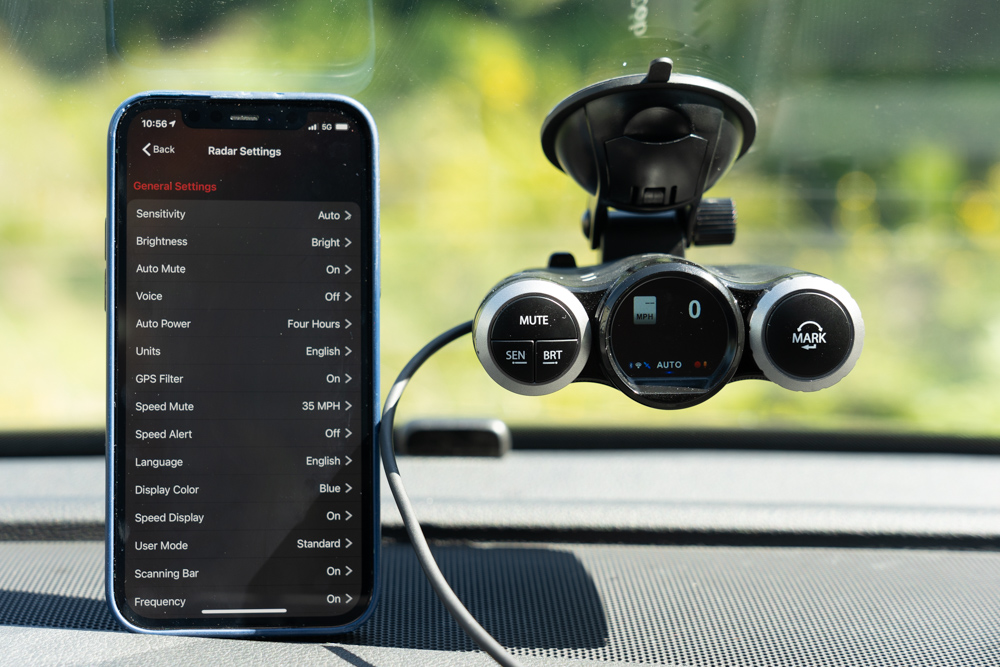
Additionally the detector can share alerts in realtime with other Cobra and Escort users. It’s a lot like Waze, except it’s more automatic given that your detector can report alerts to the cloud for you, plus you have a dedicated display for all your cloud alerts.
In practice I have seen one alert that was in iRadar that wasn’t in Waze, but the vast majority of the time if anything, it’s the other way around. I get the alert from Waze and then when I pass the officer, I press and hold the mute button on the Road Scout to manually report the officer’s location to the cloud. Hopefully that helps other users behind me.
I’ve also found a LOT of bluetooth connectivity issues with the Road Scout.
While driving, the alerts won’t reliably display on the phone and detector. Sometimes they’ll show up on the phone (if I have the app open), but not the detector. I’ve also seen many times where the iRadar alert gets frozen on the detector’s display and doesn’t keep counting down as I get closer to the officer.
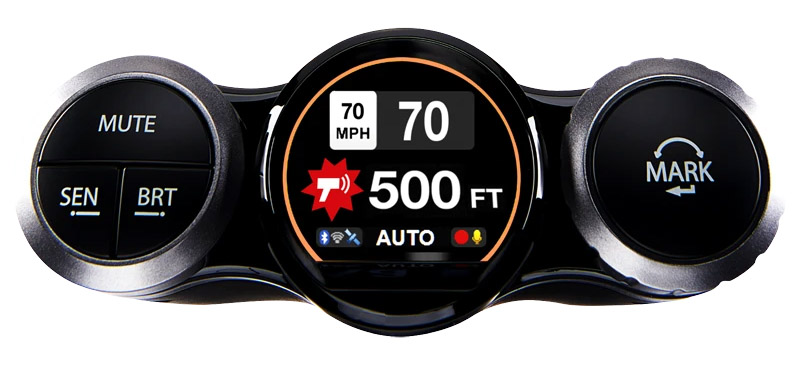
Additionally, and this may be the biggest issue, the detector essentially never reconnects to the app next time I get back in the car. Because of this, I have to go in and delete the Road Scout out of my phone and manually create a new connection. With Escort detectors, I usually only have to do this after updating the firmware, but it will reconnect automatically more often. I’ve also had better results with other Cobra detectors like the DualPro 360 or DSP9200BT. For whatever reason, I’ve had more bluetooth issues with the Road Scout than with any other Cobra/Escort detector.
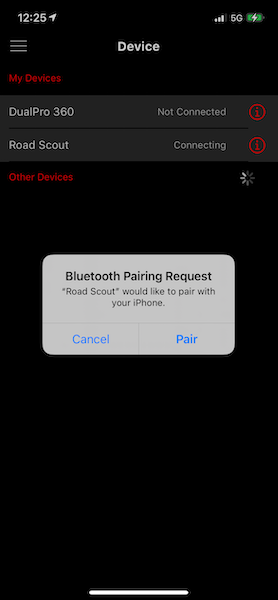
WiFi
The Road Scout also has 2.4 GHz WiFi built in, just like Escort’s “c” series detectors like the Redline 360c, Max 360c, and iXc. Besides adding some dashcam connectivity features, the WiFi also adds a couple helpful features to the radar detector:
- Realtime cloud alerts
- Not needing to connect your phone every time you get in the car
- Speed limit displayed
- Automatic firmware updates
- Automatic redlight camera & speed camera database updates
I’ve got a WiFi hotspot in my car and I love this feature just for the improved connectivity alone. It’s more reliable connecting via WiFi compared to Bluetooth.
I also like the fact that over WiFi, it can display the speed limit of the current road you’re on and display that just to the left of your speed.
However, unlike using the feature with Escort detectors, it rarely actually displays the speed. If I manually reconnect to WiFi from scratch, it will display the speed limit on screen for a few seconds, but then it disappears again. I’m not sure why it wants to blank out the PSL by default and prevent the feature from working properly.
Finally, I also like the fact that the detector can automatically check for any updates to the detector’s firmware or RLC/speedcam database and update itself wirelessly over the air. In terms of convenience, this is awesome.
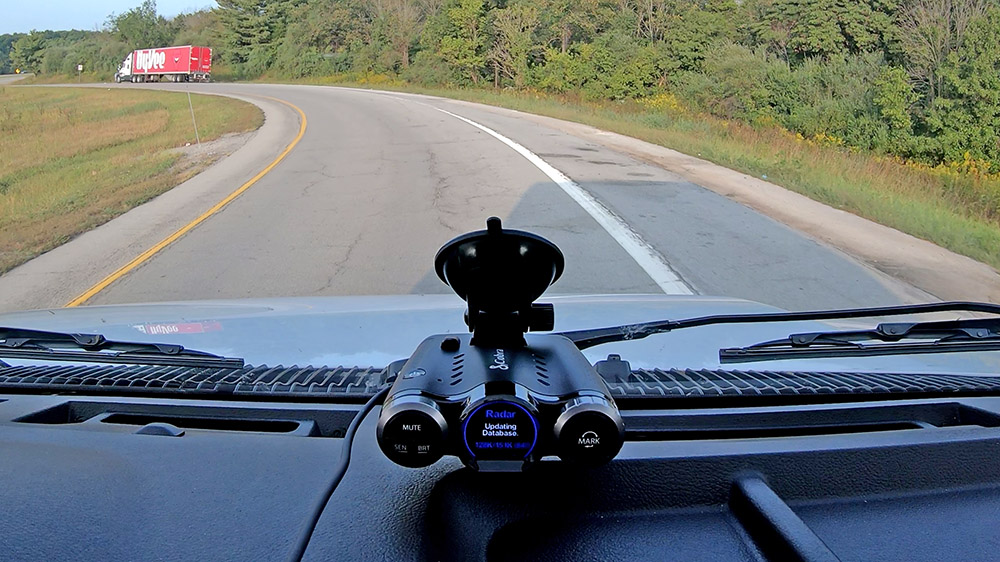
Road Scout updating its RLC database over WiFi
Dashcam
The Road Scout also features a built-in 1080p dashcam. It’s a very basic dashcam that records at full HD, just like the Escort M1. Video quality is okay, but I’d rate it as below average. Other 1080p dashcams do a better job at capturing details like license plates.
Realistically this is a super simple dashcam. All it does is power on and record while you drive. It can capture video and audio and it does offer WiFi, but really it doesn’t offer much else. For most people, that’s going to be sufficient though and they don’t need anything fancy.
Understandably, it only records ahead. There’s no rear facing or interior dashcam option. Additionally parking recording is unavailable. I could understand the lack of parking recording that since generally you don’t need your RD on while your car is parked, but other RD/dashcam combos like the Neoline 9300s do offer parking recording so…
Given that the Road Scout integrates your RD with your dashcam, I’d also love to see some radar info overlayed onto the dashcam footage, something like displaying the radar band, frequency, and signal strength onto the video clip to make sharing videos of your saves that much cooler. I think it’d be a great way to offer something unique that’s not available with standalone RD’s and dashcams.
Speaking of integration, even though the Road Scout has both a RD and a dashcam, it seems like they’re still very much two separate devices inside of one shell.
Dashcam App
There are two different apps for the RD and the dashcam. To use the other app, you have to press and hold the “BRT” button to switch from WiFi being used for iRadar to the Camera. Then you can connect with the other app. You’d think there’d be just one WiFi connection in the detector and one app to handle both radar and dashcam stuff, but that’s not the case.
With the app you can preview what the dashcam is seeing live (though you have to stop recording to stream the video), play back previously recorded footage, or adjust a few options in the dashcam.
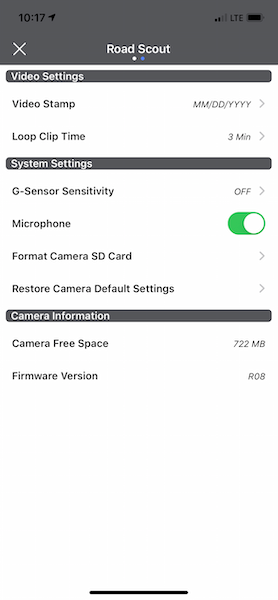
Oddly enough, certain options can only be done in the Road Scout’s menu, not via the app. For example, disabling the Cobra watermark or disabling your latitude/longitude requires you to go into the dashcam itself. Additionally, despite having GPS in the dashcam, there’s no option to display your speed on the dashcam footage at all. That’s a pretty standard feature.
As for the connectivity itself, just like with the radar detector, I regularly run into issues connecting to the dashcam with my phone.
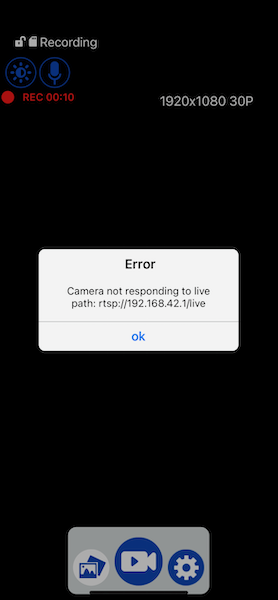
For this reason, once I do my initial configuration, I don’t really mess with the dashcam anymore. Maybe only when I want to physically move the Road Scout to a new spot on my windshield and I want to make sure it has a good field of view.
Otherwise to view any recorded footage, I’ll just pop the memory card out of the dashcam and put it in my computer. I’m not really a fan of having to switch WiFi connections and running into connectivity issues just to mess with the dashcam.
The user experience really isn’t great here.
It comes with a 16gb MicroSD card and officially only supports card up to 32gb for some reason. Dashcams nowadays typically support at least 128gb card, often even 256gb or 512gb. Cards are cheap these days and you’ll want a big card to store lots of footage before the card fills up and dashcam begins overwriting the oldest footage.
Placement Options
Speaking of placement, something odd I noticed is that the dashcam is on the right side of the dashcam, or the left side when viewing it from the rear like this:
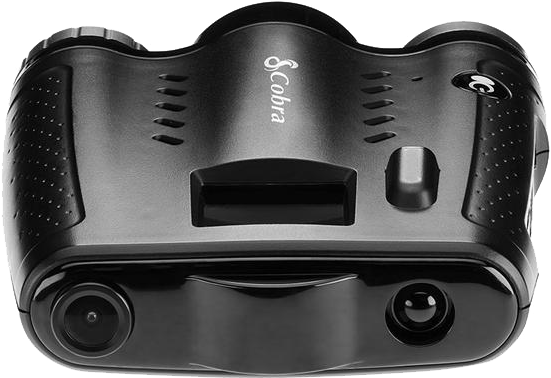
Normally I like to run my radar detector up high and to the left of my RVM for performance and ease of reach. However, if I mount it there, the RVM stem blocks the right side of the dashcam’s view.
It does mean that the laser sensor on the opposite side does have a better view of the road. Since laser detection isn’t particularly meaningful in practice though, I could mount the Road Scout on the right side of my RVM, but then it’s harder to reach the detector.
Cobra recommends mounting it centered on your windshield, under your RVM, and I agree. You’ll also want to avoid mounting it too low, behind your wipers.
Another option I really like is hanging it under my RVM with the Blendmount. Same location, but more secure and you don’t have to worry about sticky cup failures.
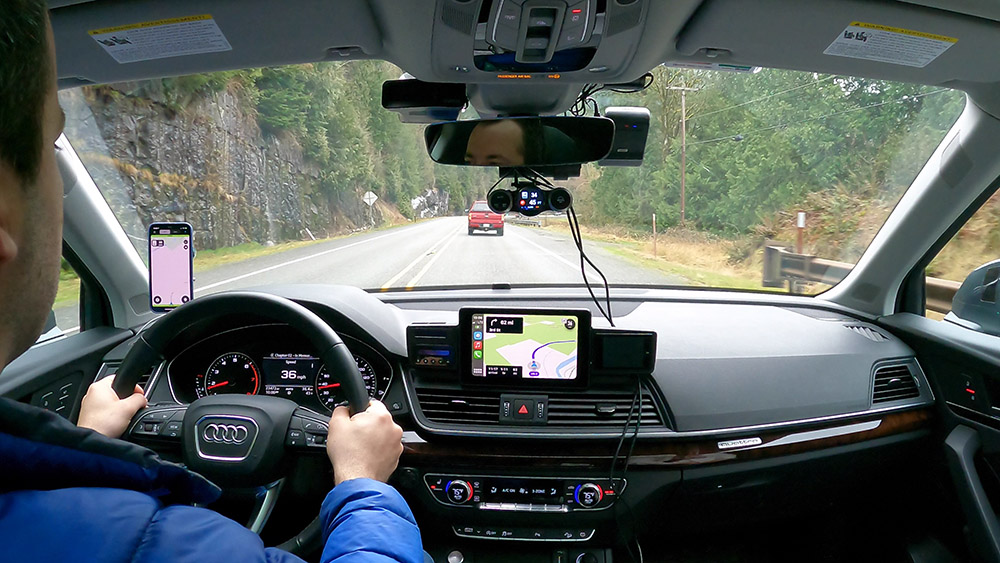
Road Scout mounted on Blendmount
Road Scout vs. other combo units
As you can probably tell so far, I’m not a huge fan of the Road Scout overall. While I like the idea of a combo unit like this, I feel like there’s too many compromises in the process. That said, how does it compare to other options? 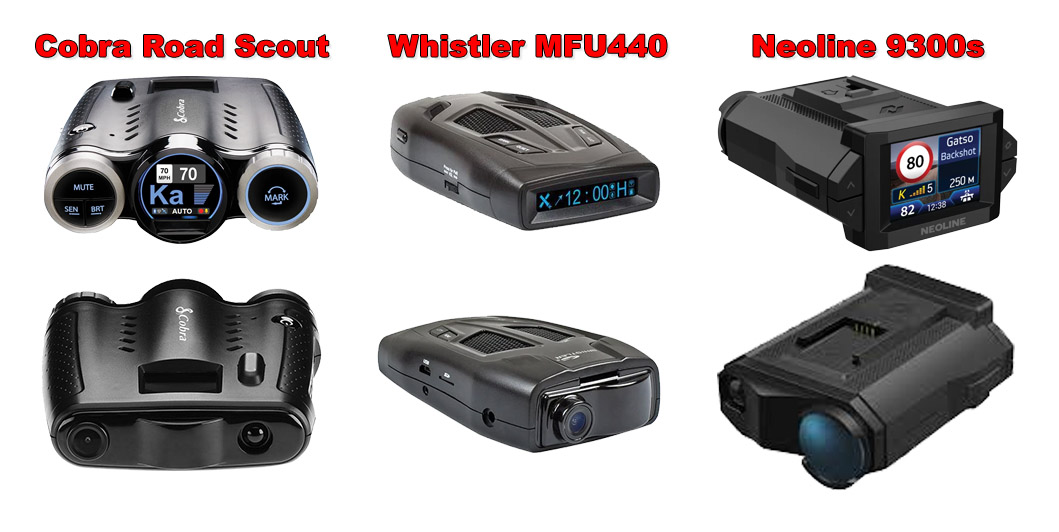
Whistler also makes the MFU440 ($249) which combines a radar detector and a dashcam too. To get to the lower pricepoint though (Road Scout retails for $449), they use a low end radar detector so performance is limited, plus it lacks features like GPS lockouts. It has a 1080p dashcam built-in too, but I’m not a fan of running low end radar detectors.
There’s also the Neoline X-COP 9300s ($429) which is priced similarly to the Road Scout. This was designed for international driving so it has more of a focus on photo radar detection. Neoline now sells it in the US, but from what I understand, they still have work to do on things like BSM filtering development do make it usable here. However, it’s got some cool features like the power connector being built directly into its quick release mount as well as a 1080p dashcam that also offers parking recording.
Road Scout vs. Separate Radar Detector & Dashcam
If you choose a standalone radar detector and dashcam, you’ll generally get more features and better performance from both, not to mention you can make an optimal choice for both the RD and the dashcam, plus it’s easier to upgrade just one part down the road as needed.
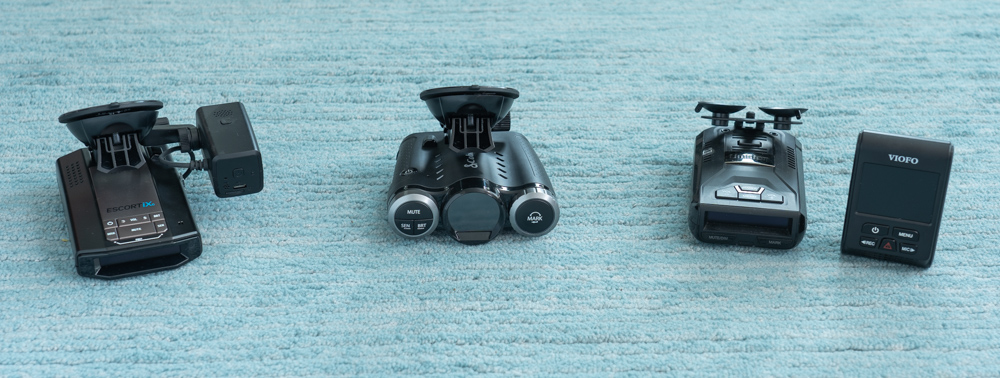
Escort iXc & M1, Cobra Road Scout, Uniden R3 & Viofo A119 v3
Compared to Escort iXc / M1
Feature-wise, the closest somewhat standalone package to the Road Scout is the Escort iXc and M1 combo ($649). It’s $200 more so it’s more expensive, but it takes the Escort iXc ($449) that also offers GPS, Bluetooth, and WiFi, and then adds on the Escort M1 ($199) which is essentially the same 1080p dashcam as what’s in the Road Scout, but designed to attach to the same sticky cup mount so again you wind up having one mount and power cable for both your radar detector and dashcam.
This setup isn’t quite as integrated and clean and it costs more, but you add things like automatic GPS lockouts instead of manual, you get a much better performing (and more usable) radar detector, plus you avoid many of the bugs that plague the Cobra unit.
Compared to Uniden R3 / Viofo A119 v3
I think my preferred solution over the Road Scout would be the Uniden R3 ($249) with the Viofo A119 v3 ($119). At $360, it costs less than the Road Scout, plus I think you get WAY more for your money.
Yes you do now have two separate devices, each needing their own power cable and so it’s not quite as convenient to install or move from car to car.
That said, the Uniden R3 is a hugely popular detector that will offer significantly better performance, your same low speed muting and manual GPS lockouts, plus some bonuses like photo radar detection. It doesn’t have Bluetooth or cloud connectivity, but those features don’t work well on the Road Scout in the first place so no biggie.
The A119 V3 is an amazing bang for the buck. It offers much better video quality since it records at 1440p instead of 1080p (2x as many pixels), plus it adds parking mode recording.
If that’s not enough, pick up the Viofo A129 Plus Duo ($179). It adds WiFi like the Road Scout so you can transfer videos directly to your phone, plus it adds a second camera to point out the back for additional coverage. Again installation is going to get more involved here and it doesn’t offer the level of convenience as the Road Scout, for sure, but it’s $430 when paired with the R3 and so it still costs less than the Road Scout…
Conclusion
Really the main appeal of the Road Scout is getting both a radar detector and a dashcam in one convenient and integrated package. With one device, one mount, and one power cable, you now get both radar detection and dashcam recording which is pretty awesome.
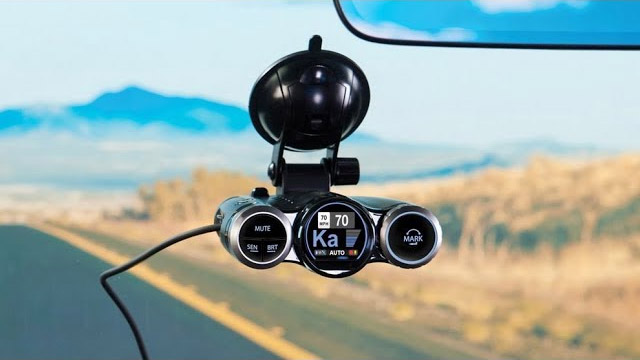
That said, there’s a ton of issues using this device that I think outweigh the benefits. If Cobra can do things like reduce the ridiculously heavy delays on K and Ka band, fix the Bluetooth and WiFi connectivity issues, and generally address the annoying issues and bugs, I’d be much more receptive to running something like the Road Scout. I’m okay with manual lockouts instead of auto and some things like overlaying radar info onto the dashcam footage would be cool, but really that’s just icing on the cake. It’s good performance that I won’t compromise on.
Fundamentally you need a radar detector with solid protection, a dashcam with good video quality, and a device that works seamlessly and smoothly, but unfortunately the Road Scout doesn’t deliver. Because of that, there’s no way I’d trust this unit personally and I wouldn’t recommend it to others either.
I do hope Cobra keeps working on this unit, along with other manufacturers also working on combo units, because this really is a cool idea. We just need to make sure the execution is also on point as well.
Where to purchase the Cobra Road Scout on Amazon.
Where to purchase the Cobra Road Scout direct from Cobra.
| This website contains affiliate links and I sometimes make commissions on purchases. All opinions are my own. I don’t do paid or sponsored reviews. Click here to read my affiliate disclosure. |






